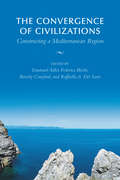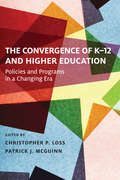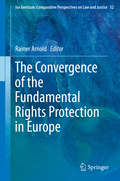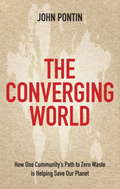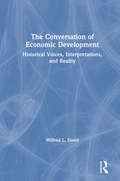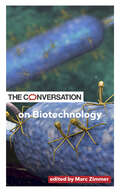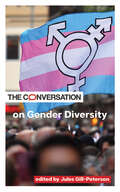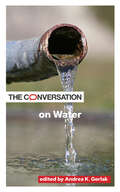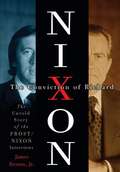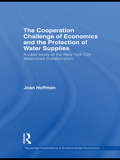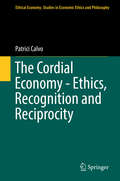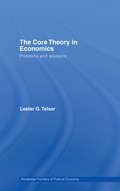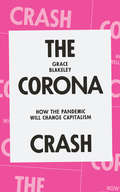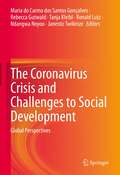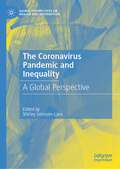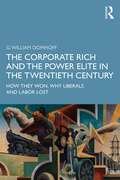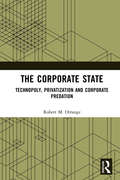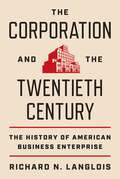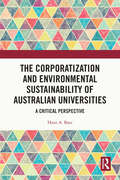- Table View
- List View
The Convergence of Civilizations
by Raffaella Del Sarto Beverly Crawford Emanuel Adler Federica BicchiRecent efforts by the United States and its allies to promote democracy, security, and stability in the Middle East owe much to the Euro-Mediterranean Partnership (EMP) - also known as the Barcelona Process - an important region-building plan in the Mediterranean region since 1995. The Convergence of Civilizations represents the output of an innovative and much needed collaborative project focused on the EMP. Editors Emanuel Adler, Beverly Crawford, Federica Bicchi, and Rafaella A. Del Sarto have set out to show that regional security and stability may be achieved through a cultural approach based on the concept of regional identity construction, and aim to take stock of the EMP in relation to this goal.The contributors to this collection focus on the obstacles Mediterranean region construction faces due to post 9/11 regional and global events, the difficulties of the Israeli-Palestinian peace process, tensions between the EU and the US over Iraq, and the expected consequences of EU enlargement. They also seek to bring the EMP and region-making practices to the attention of American scholars in order to promote a more fertile academic exchange.Ultimately, the contributors demonstrate that the EMP and related region-making practices, while failing so far to promote the development of a Mediterranean regional identity and to achieve regional stability, suggest nonetheless a viable model for regional partnership and cooperation, and thus, for preventing a 'clash of civilizations' in the long haul. The Convergence of Civilizations will be an important tool for meeting the current global challenges being faced by nation-states as well as those in the future.
The Convergence of K-12 and Higher Education: Policies and Programs in a Changing Era (Educational Innovations Series)
by Christopher P. Loss and Patrick J. McGuinnIn The Convergence of K–12 and Higher Education, two leading scholars of education policy bring together a distinguished and varied array of contributors to systematically examine the growing convergence between the K–12 and higher education sectors in the United States. Though the two sectors have traditionally been treated as distinct and separate, the editors show that the past decade has seen an increasing emphasis on the alignment between the two. At the same time, the national focus on outcomes and accountability, originating in the K–12 sector, is exerting growing pressure on higher education, while trends toward privatization and diversification—long characteristic of the postsecondary sector—are influencing public schools. This volume makes the powerful case that it is no longer possible to think of one sector in the absence of the other, given the economic, demographic, and technological forces that are pushing the educational system toward convergence. Taken together, the chapters in this book provide a promising new line of inquiry for examining contemporary questions in education policy.
The Convergence of the Fundamental Rights Protection in Europe
by Rainer ArnoldThe book gives insightinto the structures and developments of the fundamental rights protection inEurope which is effective at the levels of the national Constitutions, theEuropean Convention of Human Rights and, for the EU member States of the EUFundamental Rights Charter. The contributions of renowned academics fromvarious European countries demonstrate the functional interconnection of theseprotection systems which result in an increasing convergence. Basic questionsare reflected, such as human dignity as foundation of fundamental rights orpositive action as a specific form of equality as well as the concept of rightsconvergence. In this latter contribution the forms of direct reception of adifferent legal order and of the functional transfer of principles and conceptsare analyzed. Particular reference is made to the EU Charter, the UnitedKingdom Human Rights Act as well as to France and Germany. It becomes obvioushow important interpretation is for the harmonization of national andconventional fundamental rights protection. Traditional institutionalapproaches like the dualist transformation concept in Germany are functionallyset aside in the harmonization process through constitutional interpretation. Specificstudies are dedicated to the field of the EU Fundamental Rights Charter and to theEuropean impacts on the national fundamental rights protection in selectedcountries such as the "new democracies" Poland, Romania and Kosovo as well as more traditional systems such as Spain, Italy, the Nordic countries or Turkey.
The Converging World: How One Community's Path to Zero Waste is Helping Save Our Planet
by John PontinTHE CONVERGING WORLD tells the incredible story of one community's attempt to change their world for the better. Faced with the challenge of making the English village of Chew Magna a 'zero waste' society, Pontin developed a groundbreaking non-profit scheme that twinned them with Tamil Nadu, a poor rural community in southern India. He helped set up a system of wind turbines for Tamil Nadu that would not only reduce the community's reliance on fossil fuels but also provided a local source of sustainable income. The carbon credits produced through this scheme were then sold in Chew Magna to individuals and businesses to offset emissions they cannot yet reduce - all part of a larger local zero-waste effort. The effects of this scheme have been dramatic and exhilarating - while Chew Magna gets closer to zero waste, Tamil Nadu's carbon emissions and poverty levels are diminishing accordingly. Pontin's story presents a model of action for any individual or community concerned about climate change, environmental damage, social inequality and the plight of the third world.
The Converging World: How one community's path to zero waste is helping save our planet
by John PontinTHE CONVERGING WORLD tells the incredible story of one community's attempt to change their world for the better. Faced with the challenge of making the English village of Chew Magna a 'zero waste' society, Pontin developed a groundbreaking non-profit scheme that twinned them with Tamil Nadu, a poor rural community in southern India. He helped set up a system of wind turbines for Tamil Nadu that would not only reduce the community's reliance on fossil fuels but also provided a local source of sustainable income. The carbon credits produced through this scheme were then sold in Chew Magna to individuals and businesses to offset emissions they cannot yet reduce - all part of a larger local zero-waste effort. The effects of this scheme have been dramatic and exhilarating - while Chew Magna gets closer to zero waste, Tamil Nadu's carbon emissions and poverty levels are diminishing accordingly. Pontin's story presents a model of action for any individual or community concerned about climate change, environmental damage, social inequality and the plight of the third world.
The Conversation of Economic Development: Historical Voices, Interpretations and Reality
by Wilfred L. DavidThis book investigates the belief patterns that underly alternative perspectives of development thought and policy. It discusses the differing theories and models of development in a discursive manner to highlight the importance of interaction between academic discourse and everyday life experiences. Utilizing insights drawn from the history of ideas, economic history, philosophy and political economy, the author shows how the field of development economics has evolved.
The Conversation on Biotechnology (Critical Conversations)
by Marc ZimmerFrom the contributors to The Conversation, this collection of essays by leading experts in biotechnology provides foundational knowledge on a range of topics, from CRISPR gene sequencing to the ethics of GMOs and "designer babies."In The Conversation on Biotechnology, editor Marc Zimmer collects essays from The Conversation U.S. by top scholars and experts in the field, who present a primer on the latest biotechnology research, the overwhelming possibilities it offers, and the risks of its abuse. From an overview of CRISPR technology and gene editing in GMOs to the ethical questions surrounding "designer babies" and other applications of biotechnology in humans, it highlights the major implications biotechnology will bring for health and society. Topics range from the spectacular use of light to fire individual neurons in the brain to making plant-based meats; from curbing diseases with genetically modified mosquitoes to looking back on 40 years of opinions on IVF babies.The Critical Conversations series collects essays from top scholars on timely topics, including water, biotechnology, gender diversity, gun culture, and more, originally published on the independent news site The Conversation U.S.Contributors: Nathan Ahlgren, Ivan Anishchenko, Trine Antonsen, Jennifer Barfield, Pedro Belda-Ferre, Ari Berkowitz, Adeline Boettcher, Jason Delbourne, Kevin Doxzen, Mo Ebrahimkhani, Eleanor Feingold, J. Benjamin Hurlbut, Cecile Janssens, Samira Kiani, Amanda Kowalczyk, Mariana Lamas, Andrew Lapworth, Rebecca Mackelprang, Kathleen Merrigan, Saman Naghieh, Sean Nee, Dimitri Perrin, Christopher Preston, Jason Rasgon, Penny Riggs, Jason Robert, Oliver Rogoyski, Gary Samore, Sahotra Sarkar, George E. Seidel, Patricia A. Stapleton, Craig W. Stevens, Paul B. Thompson, Christopher Tuggle, Vikramaditya G. Yadav, Marc Zimmer
The Conversation on Gender Diversity (Critical Conversations)
by Jules Gill-PetersonFrom contributors to The Conversation, a look at gender diversity in the twenty-first century and the intricate and intersecting challenges faced by trans and nonbinary people.With media amplifying the voices of anti-trans legislators and critics, it is important to turn to the stories, research, and expertise of trans and nonbinary people in order to understand the reality of their experiences. In The Conversation on Gender Diversity, editor Jules Gill-Peterson assembles essential essays from The Conversation U.S. by experts on gender diversity. The essays guide readers through seldom-covered aspects of transgender history and present an overview of the social and political barriers that disenfranchise trans people and attempt to remove them from public life. As these essays collectively show, trans and nonbinary people may be forced to be the face of gender and its diversity, but the cultural, political, and social realities of gender connect—and subject—everyone. Despite these challenges, there is an immense culture of love and support across the queer community that is bolstered by activists and allies working against transphobic attacks. Trans and gender-diverse youth are growing up in a world filled with ever-increasing hurdles and rising danger, even with the contemporary public recognition of trans life in culture and media. But they are not facing these challenges alone.The Critical Conversations series collects relevant essays from top scholars on timely topics, including water, biotechnology, gender diversity, gun culture, and more, originally published on the independent news site The Conversation U.S. Contributors: Robert L. Abreu, Catherine Armstrong, Stacy Branham, Christopher Carpenter, L. F. Carver, Mandy Coles, Arin Collin, George B. Cunningham, Avery Dame-Griff, Jules Gill-Peterson, Abbie Goldberg, Gilbert Gonzales, Frances Grimstad, Foad Hamidi, Elizabeth Heineman, Glen Hosking, Bethany Grace Howe, Jay A. Irwin, Shanna K. Kattari, Kacie Kidd, Terry Kogan, Vanessa LoBue, Gabriel Lockett, Megan K. Maas, Julie Manning Magid, Em Matsuno, Tey Meadow, Kyl Myers, Madeleine Pape, Ruth Pearce, Jae A. Puckett, Samantha G. Rosenthal, Morgan Klaus Scheuerman, Elizabeth A. Sharrow, Carl Sheperis, Donna Sheperis, stef m. shuster, Jules Sostre, Ryan Storr, Carl Streed, Diana M. Tordoff, Travers
The Conversation on Water (Critical Conversations)
by Andrea K. GerlakFrom the contributors to The Conversation, a compelling essay collection on the world's water crises and the necessary steps to build a more sustainable and equitable water future for all.Water-related crises are affecting more and more communities, both in the United States and internationally. If we continue to delay upgrading our infrastructure and addressing rising environmental concerns, we risk further destabilizing already strained systems—or, worse, causing a catastrophic collapse. In The Conversation on Water, water scholar and professor Andrea K. Gerlak collects essays from The Conversation U.S. on critical issues related to water from leading experts in everything from public policy to environmental engineering.Gerlak pays special attention to the threats facing our water systems today—covering insufficient infrastructure, climate change, and pollution—and integrates them with essays on technologies for harvesting water and Indigenous knowledge in governing the oceans. She then proposes solutions that present opportunities for hope and reform. From new partnerships and collaborative efforts to alternative governance practices and new scientific tools and community approaches, readers will learn about viable pathways forward and will understand the deep social and political dimensions of water governance. Understanding these challenges is the first step toward building a more sustainable and equitable water future for all. The Critical Conversations series collects essays from top scholars on timely topics, including water, biotechnology, gender diversity, gun culture, and more, originally published on the independent news site The Conversation U.S. Contributors: Roger Bales, Kevin Befus, Robert Blasiak, Ellen Bruno, Bethany Caruso, Sebastien Chastin, Craig E. Colten, Joseph Cook, Michelle DiBenedetto, Farshid Felfelani, Gabriel Filippelli, Michail Georgiou, Burke Griggs, Gary Griggs, Drew Gronewold, Marissa Grunes, Danielle Hare, Brian Haus, Dan Johnson, Carol Kwiatkowski, Rosalyn R. LaPier, Katharine Mach, Amahia Mallea, Daniel McCool, Jacob Miller-Klugesherz, Nobuhito Mori, Thomas Mortlock, Suzanne O'Connell, Itxaso Odériz, Joseph D. Ortiz, Meg Parsons, Raquel Partelli-Feltrin, Yadu Pokhrel, Manzoor Qadir, Julie Reimer, Landolf Rhode-Barbarigos, Richard Rood, Asher Rosinger, Matthew R. Sanderson, Heidi Schweizer, Alan Seltzer, A. R. Siders, Rodolfo Silva-Casarín, Vladimir Smakhtin, Bruce Sutherland, Lara Taylor, Emily Ury, Ton Van den Bremer, Andrew J. Whelton
The Conviction of Richard Nixon
by James Reston Jr.While Richard Nixon avoided conviction on impeachment charges by resigning from the White House, the 1977 televised interviews conducted with Nixon by David Frost convicted Nixon as a political pariah in the minds of many viewers. The author of this book served as the Watergate advisor to Frost for the interviews and here recounts his insider's view of the interviews. The text was written contemporaneously but is being published now for the first time. Annotation ©2008 Book News, Inc. , Portland, OR (booknews. com)
The Cool War
by Frederik PohlMultiple winner of science-fiction's top awards presents a breathtaking romp through the energy-poor world of the 2020s
The Cooperation Challenge of Economics and the Protection of Water Supplies: A Case Study of the New York City Watershed Collaboration (Routledge Explorations In Environmental Economics Ser.)
by Joan HoffmanHow can we build the institutions that will promote the cooperation needed to meet our intertwined environmental and economic needs? Efforts to meet these twin goals in New York City’s watershed collaborations offer some guidance. The experience provides lessons in addressing scattered sources of pollution, encouraging environmentally compatible economic development, and coping with conflicts that are part of the collaboration process. It also yields insights into what we need to work effectively towards sustainable economic development. This book identifies many barriers to achieving the cooperation necessary to solving our water problems and discusses how watershed collaborations are a means to overcoming those barriers. Historical experience and lessons from other watershed collaborations informed the design of New York City’s complex watershed collaboration which is shown to contain the elements of a "green milieu" that can foster sustainable economic development. The particular challenges to the collaboration’s environmental and economic goals created by the watershed’s rural economy, farming and forestry are described. The unusual inclusion of the analysis of the economic aspects and effects of collaboration, of the relationship between collaboration and sustainable development, and of the processes of implementation and conflict make this book especially valuable to those interested in collaboration, regulation, environmental cooperation and conflict, watershed protection, economic development in general, and sustainable economic development in particular.
The Cordial Economy - Ethics, Recognition and Reciprocity (Ethical Economy #55)
by Patrici CalvoThis book proposes, from a civil perspective —such as that developed by Stefano Zamagni— and a cordial perspective —such as that developed by Adela Cortina—, orientations to design an economy in tune with what the historical moment demands. Among other things, this comes from encouraging institutions, organisations and companies to include in their designs aspects as important for carrying out their activities as cordial reciprocity, mutual recognition of the communicative and affective capacities of the linked or linkable parties, public commitment and the active participation of civil society.The book first shows the conceptualisation of the process of self-interest as operating for one’s own benefit and its inclusion in the orthodox economic model. In Chapter 2 it then displays some of the logical/formal and experimental limits of the axiomatic economics model to discover the possibility of building bridges between theoretical modelling and factual validation. Chapter 3 demonstrates the fragility of a rationality model based on the paradigmatic figure of homo oeconomicus. Chapter 4 reflects on the critical process that has identified reciprocity as a determining factor for human cooperation, turning this behaviour into a paradox in which the lack of a reasonable explanation from the selfish perspective becomes inconsistent in the predominant economic theory. Chapter 5 is from a moral point of view it describes and criticises the different approaches to reciprocity observed by sociologists, biologists, psychologists and economists. Chapter 6 analyses three mutual recognition proposals as possible foundations for human cooperation, highlighting one of them –cordial recognition, developed by Cortina– because it is more closely related to studies of reciprocity, particularly the most recent contributions from the neurosciences. Chapter 7 proposes cordial reciprocity as a horizon of meaning for the various approaches to reciprocity observed. Chapter 8 explores the possible emergence and development of cordial goods, a type of relational and communicative good that enables joint actions to take place in different contexts of human activity. Chapter 9 analyses the application and implementation of cordial reciprocity at the macro, meso and micro levels of the economy. And finally, it proposes guidelines for designing a monitoring and compliance system which, based on the communication, storage and processing of big data and the committed participation of stakeholders, offers businesses the possibility of inspecting their underlying dimensions of morality, emotions and responsibility.
The Core Theory in Economics: Problems and Solutions (Routledge Frontiers of Political Economy)
by Lester TelserAn important tenet of game theory, core theory has nonetheless been all but ignored by the mainstream. Its basic premise is that individuals band together in order to promote their interests as much as possible. The return to an individual depends on competition among various coalitions for its membership, and a group of people can obtain a joint maximum by suitable coordinated actions. In this key title, Lester Telser investigates the following issues: Markets Multiproduct Industry Total Cost Functions with Avoidable Costs Critical Analyses of Noncooperative Equilibria. Through these distinct sections, Telser skilfully brings the ideas of core theory to bear on a range of issues within economics – with particular emphasis on supply and demand and the way markets function.
The Core-Periphery Divide in the European Union: A Dependency Perspective
by Rudy WeissenbacherThis book revisits the forgotten history of the 'European Dependency School' in the 1970s and 1980s, explores core-periphery relations in the European integration process and the crises of the contemporary European Union from a dependency perspective, and draws lessons for alternative development paths. Was disintegration of the European Union foretold? With the benefit of hindsight, the critical analysis of the European integration process by researchers from the 'European Dependency School' is most timely. The current framework of the European Union seems to be haunted by issues that had been very familiar to the researchers of the 'European Dependency School', such as a lack of a common and balanced industrial policy. How do the situations compare? What lessons can be learnt for alternative development policies in contemporary Europe? Weissenbacher tackles these issues, which are of relevance to all interested in political economy, political science, development studies and regional development.
The Corgi and the Queen
by Caroline L. PerryEven a monarch needs a best friend and Queen Elizabeth II found one in a corgi pup she named Susan. From princesshood to queendom the pair forged an unbreakable bond, with Susan even participating in Elizabeth’s wedding day and joining her on honeymoon with Prince Philip. Over the course of her remarkable seventy-year reign the Queen had more than thirty corgi companions, and almost all were direct descendants of her cherished Susan.Godwin Books
The Corona Crash: How the Pandemic Will Change Capitalism (CORONAVIRUS PAMPHLETS)
by Grace BlakeleyFree market, competitive capitalism is dead. The separation between politics and economics can no longer be sustained.In The Corona Crash, leading economics commentator Grace Blakeley theorises about the epoch-making changes that the coronavirus brings in its wake. We are living through a unique moment in history. The pandemic has caused the deepest global recession since the Second World War. Meanwhile the human cost is reflected in a still-rising death toll, as many states find themselves unable—and some unwilling—to grapple with the effects of the virus. Whatever happens, we can never go back to business as usual. This crisis will tip us into a new era of monopoly capitalism, argues Blakeley, as the corporate economy collapses into the arms of the state, and the tech giants grow to unprecedented proportions. We need a radical response. The recovery could see the transformation of our political, economic, and social systems based on the principles of the Green New Deal. If not, the alternatives, as Blakeley warns, may be even worse than we feared.
The Coronation Of Queen Elizabeth (Great Events #8)
by Gillian ClementsThe book tells the story of the coronation of Queen Elizabeth II. From her birth, the royal experiences of World War II, to the exciting celebrations of her accession to the throne, follow her story through simple text and illustrations.This book is part of a series of books, Great Events, which are suitable for ages 6-12. They tell the stories of great events in history. Written by successful authors, they are enjoyable reads which are packed with facts and illustrations.Each book includes a timeline of key dates, a quiz and index.
The Coronavirus Crisis and Challenges to Social Development: Global Perspectives
by Rebecca Gutwald Tanja Kleibl Ronald Lutz Ndangwa Noyoo Maria do Carmo dos Santos Gonçalves Janestic TwikirizeThis book is a novel contribution to academic discourses on the coronavirus (COVID-19) crisis and how it has impacted societies globally. It proffers an overview on the social development and political measures, from both the Global North and Global South, to prevent COVID-19's spread. It illuminates major social, political and economic challenges that already existed in different contexts and which are also currently being amplified by COVID-19. Curiously, this global pandemic has opened spaces for different actors, across the globe, to begin to fundamentally question and challenge the hegemony of the Global North, which sometimes is evident in social work. Linked to the foregoing and while reflecting beyond the pandemic and into the future, the book proposes that social work must become more political at all levels, and strive to transform societies, global social development efforts, and economic and health systems. This contributed volume of 38 chapters discusses and analyses ethical, social, sociological, social work and social development issues that complement and enrich available literature in the socio-political, economics, public health, medical ethics and political science. It provides various case studies which should enable readers to gain insights into how countries have responded to the pandemic and learn how COVID-19 negatively impacted countries in different parts of the world. This book also provides a platform for the articulation of neglected and marginalized voices, such as those of indigenous populations, the poor, or oppressed. The chapters are grouped according to three main themes as they relate to research on the COVID-19 pandemic and social work in Africa, Asia, Europe, Latin America and North America:Analysis: Social Issues and the COVID-19 Pandemic Strategies and Responses in Social Work: Globally and LocallyOutlook: Looking Ahead Beyond the PandemicIntended to engage a global, diverse and interdisciplinary audience, The Coronavirus Crisis and Challenges to Social Development is a timely and relevant resource for academics, students and researchers in inter alia Social Work, Philosophy, Sociology, Economics, and Development Studies.
The Coronavirus Pandemic and Inequality: A Global Perspective (Global Perspectives on Wealth and Distribution)
by Shirley Johnson-LansThis book examines the effects of the Covid-19 pandemic on the degree of inequality in wellbeing (income and wealth, health, access to health care, employment, and education) in a number of different countries around the globe. The effect of socioeconomic inequality within a country on the outcome of the pandemic is also considered. This book studies the differential effects of Covid based on location, age, income, education, gender, race/ethnicity, and immigrant status. Special attention is devoted to indigenous populations and those who are institutionalized. The short- and long-term effects of public policy developed to deal with the pandemic’s fallout are studied, as are the effects of the pandemic on innovations in health care systems and likely extensions of public policy instituted during the pandemic to alleviate unemployment, poverty, and income inequality.
The Corporate Rich and the Power Elite in the Twentieth Century: How They Won, Why Liberals and Labor Lost
by G. William DomhoffThe Corporate Rich and the Power Elite in the Twentieth Century demonstrates exactly how the corporate rich developed and implemented the policies and created the government structures that allowed them to dominate the United States. The book is framed within three historical developments that have made this domination possible: the rise and fall of the union movement, the initiation and subsequent limitation of government social-benefit programs, and the postwar expansion of international trade. The book’s deep exploration into the various methods the corporate rich used to centralize power corrects major empirical misunderstandings concerning all three issue-areas. Further, it explains why the three ascendant theories of power in the early twenty-first century—interest-group pluralism, organizational state theory, and historical institutionalism—cannot account for the complexity of events that established the power elite’s supremacy and led to labor’s fall. More generally, and convincingly, the analysis reveals how a corporate-financed policy-planning network, consisting of foundations, think tanks, and policy-discussion groups, gradually developed in the twentieth century and played a pivotal role in all three issue-areas. Filled with new archival findings and commanding detail, this book offers readers a remarkable look into the nature of power in America during the twentieth century, and provides a starting point for future in-depth analyses of corporate power in the current century.
The Corporate State: Technopoly, Privatization and Corporate Predation
by Robert M. OrrangeThis book critically examines key features of the contemporary organizational landscape by focusing on major beneficiaries of recent historical politicalcultural transformations involving the embrace of market fundamentalism and a market society: corporations, those who direct them, and those who use them for their own benefit. Part I examines the big US-based tech firms (i.e., Facebook, Google, Apple, and Amazon), highlighting numerous tensions and contradictions between their highly cultivated, flattering, yet unwarranted public images and the reality of how they operate as extremely competitive, at times deceptive, profitseeking entities. A focus on these firms also highlights just how dramatically the economic realm has been transformed over the past few decades due to accelerating advances in information technology and corporate-managed globalization. Part II explores how the state has been pushed back via privatization and corporate predation in such areas as health care, military/security, criminal justice, philanthropy, and education and concludes by looking forward with a vision of a knowledge-caring society that must rebalance corporate-managed market fundamentalism. Through the use of clear cases that bring the theory to life for students, the book is ideal as a supplementary text for advanced undergraduate and graduate students in a range of coursework in the fields of organizational theory and behavior, leadership in organizations, and management responsibility and business ethics. It will also be of great interest to students of sociology, specifically in the areas of complex organizations, economic sociology, theory, political sociology, and law and society.
The Corporation and the Twentieth Century: The History of American Business Enterprise (The\princeton Economic History Of The Western World Ser. #119)
by Richard N. LangloisA definitive reframing of the economic, institutional, and intellectual history of the managerial eraThe twentieth century was the managerial century in the United States. An organizational transformation, from entrepreneurial to managerial capitalism, brought forth what became a dominant narrative: that administrative coordination by trained professional managers is essential to the efficient running of organizations both public and private. And yet if managerialism was the apotheosis of administrative efficiency, why did both its practice and the accompanying narrative lie in ruins by the end of the century? In The Corporation and the Twentieth Century, Richard Langlois offers an alternative version: a comprehensive and nuanced reframing and reassessment of the economic, institutional, and intellectual history of the managerial era.Langlois argues that managerialism rose to prominence not because of its inherent superiority but because of its contingent value in a young and rapidly developing American economy. The structures of managerialism solidified their dominance only because the century’s great catastrophes of war, depression, and war again superseded markets, scrambled relative prices, and weakened market-supporting institutions. By the end of the twentieth century, Langlois writes, these market-supporting institutions had reemerged to shift advantage toward entrepreneurial and market-driven modes of organization.This magisterial new account of the rise and fall of managerialism holds significant implications for contemporary debates about industrial and antitrust policies and the role of the corporation in the twenty-first century.
The Corporatization and Environmental Sustainability of Australian Universities: A Critical Perspective
by Hans BaerAnalysing the juxtaposition of two trends in universities – corporatisation and environmental sustainability – this book explores how they are more contradictory than compatible. Hans A Baer argues that this contradiction is unavoidable because of the capitalist parameters in which they operate, including a commitment to on-going economic growth which contributes to social inequality, environmental degradation, and greenhouse gas emissions. Drawing on archival sources and Baer’s experiences in university sustainability forums, the book exposes how what universities claim to do in relation to environmental sustainability compares with their research, educational, operational and institutional activities. Presenting a critique of and a radical alternative to the status quo, this book is suitable for academics and students of anthropology, environmental studies and higher education.
